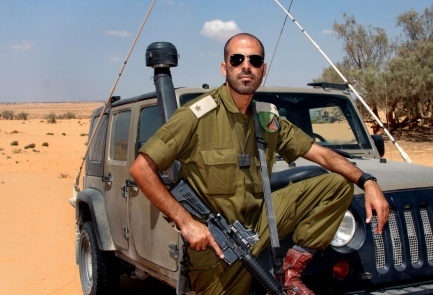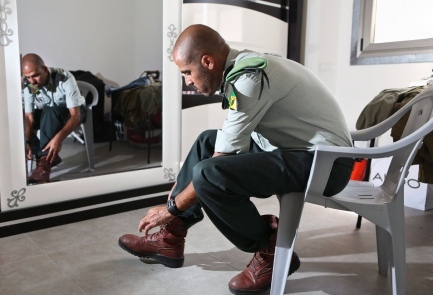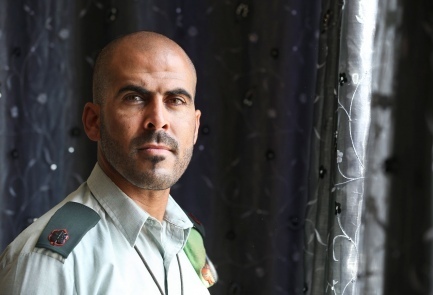An officer and a Muslim Zionist
By Michal Yaakov Yitzhaki
This piece is excerpted from Israel Hayom. The complete article can be found here.
“I am the operations officer at the IDF ground forces training base at Tze’elim,” Ala Wahib says at the start of our conversation, his eyes twinkling with excitement. “I am like the mother and father of that place,” he adds. “The only thing is that I don’t really have anyone to share it with, so I make sure to pat myself on the back every now and again, and say ‘dude, you’re awesome. Look how far you’ve come.’”

Maj. Ala Wahib in the field. | Photo credit: Osnat Krasnansky
The truth is that he deserves these accolades. It is not every day that a Muslim Arab, hailing from a village whose residents largely do not recognize Israel’s right to exist, comes to serve in the Israel Defense Forces. And he doesn’t only serve: Major Wahib, 32, is currently the highest ranking Muslim officer in the IDF. He is enormously patriotic, a true Zionist. Precisely the kind of person we like to see lighting the torches during the national Independence Day ceremony every year.
But still, Wahib came to this interview with immense trepidation. Even today, after 12 years in the Israeli military, he still doesn’t feel comfortable openly discussing his views.
For years he struggled on all fronts: he fought against the residents of his village, who to this day refer to him as a traitor, and he fought the military institution that never fully understood his motives.
"In my village, they can’t understand what could possibly motivate me to protect a country that is not my own. In the army there are people who know me and would go all the way with me, but there are those who don’t know me and don’t really know how to relate to me,” he says.
So why did he decide to give this interview, with his face exposed and his full name in print?
“Because it is important to me to show the Arab public what they are missing. There are quite a lot of people [in the Arab community] who want to enlist, but they are afraid and they don’t know if they will be accepted by their environment. It is important to me to show them the road I’ve traveled, and to make them understand that it is possible.”
His Hebrew is fluent, without a hint of an accent, and he could easily be mistaken for an average Tel Avivian. A map of the training grounds hangs on his office wall, and his green eyes constantly sweep it, making sure again and again that everything is under control. Every once in a while a soldier will knock on the door, asking permission for this or that mission, and one of them, noticing the newspaper crew, can’t resist and says “write that he is the best commander there is.” Wahib tries to hide an embarrassed smile and tells the soldier to get his backside back to the field.
He describes himself as a “Zionist Israeli Arab.” Four years ago he went on a tour of Nazi extermination camps in Poland, together with his fellow officers, as part of the IDF’s Witnesses in Uniform program. “As a child,” he says, “I grew up in a society that denies the Holocaust. When I arrived in Poland I was shocked. I cried a lot. It was difficult to contain this thing called genocide. There was something very powerful in the fact that I was standing on Polish soil, holding an Israeli flag and donning the uniform of the Israeli army, but this time from a position of power. It was proof that we can’t be broken.”
When Wahib says “we” he means the Jewish people. “I believe in the Muslim faith, and I will never abandon it, but I think that Zionism is more than a religion. It is something that fully represents my sense of belonging to the State of Israel and to Israeli society, and the immense commitment I have to protecting and guarding the country of which I am part.”

Maj. Ala Wahib: ""From the age of zero I was told that Israel stole Palestine from us, but when I was 14 I woke up." | Photo credit: Ziv Koren
...
He was born in the village of Reineh in the Galillee, which currently houses some 17,000 residents, more than 80 percent of whom are Muslim. His father was born in Syria, and had two wives. Each wife had four children. Wahib is the second son of the second wife. Today he lives alone in the village, in a huge house that he built himself. The dichotomy that characterizes his life can easily be seen in his house: modern Israeli furniture side by side with traditional Arab pieces. Two statues of dogs welcome guests, perhaps as a warning to ill wishers to keep their distance.
The price he pays for serving in the IDF is dear. It is a price he pays daily. He has no contact with any of the people in his village, and the only friends that ever visit are his colleagues from the army. “In Arab society it is customary to be involved in each other’s lives, there is no privacy,” he says sadly. “I often prefer the company of the cows that graze down here. They don’t judge me, they let me live my life in peace. I built this house to show everyone all that I’ve achieved – in our society the size of your house is a social status symbol. But today there is nothing tying me to this place. When people ask me where my home is, I immediately answer that my home is my room on the base.”
...
The overwhelming majority of residents of Wahib’s village do not recognize Israel’s right to exist on “Palestinian land.” Wahib says that “from the age of zero I was told that Israel took Palestine away from us, so naturally I referred to myself as a citizen of Palestine. I didn’t recognize the Israeli flag, and I certainly didn’t see myself as part of the country. Every once in a while I would take part in an anti-Israel demonstration, but I never threw rocks.”
He woke up, he says, when he was 14 years old and began studying at the technological high school in Nazareth – a Christian boarding school. There he was exposed to the modern world for the first time. The distance from the village and the family, during these teenage years when one develops an identity, took its course. “The Christian Arabs’ culture is similar to the Europeans'. They are less fanatic and far more modern than the Muslims. The lessons at the school followed Education Ministry guidelines, and I suddenly discovered a world that I never knew existed."
I discovered that the Jews weren’t as bad as I was told growing up. I discovered that they have a good side that I am drawn to. I identified with their principles and the way they protect one another. I felt that I wanted to become a part of this country... You could say that I really emerged from the bubble I had been living in. My eyes were opened wide and when that happens, it is very difficult to close them again.”
“I still remember, to this day, the looks I would get. [Arab] Children would follow me around calling me ‘Jew’ and ‘traitor’ and very quickly I realized that it was better to be smart than to be right. I tried to come home late at night, to draw as little fire as possible... I don’t want to stir up trouble. I sometimes come home late at night, starving, and I want to stop at the convenience store to buy something to eat but I don’t dare do it in uniform. By the time I go home and change I don’t have the energy to go out again. I remember one time when I couldn’t resist and I came into the village with an Israeli flag attached to my car. I was sure that someone would take it down, but it was still there in the morning." ...
“I found myself in Judea and Samaria, dealing with a fanatic Arab population and a Jewish population who was there because of their beliefs, and they both hate each other. I think that it was there, of all places, that the fact that I was Arab gave me an advantage. I was often able to accurately assess the situation thanks to my understanding of Arab mentality.
“One day, a young Arab woman arrived at the checkpoint with a knife and tried to stab a soldier. When I was called to the scene she burst into tears and showed me her body. It was covered with black and blue marks. I understood that she had been severely beaten at home for having soiled the family’s honor and that she didn’t really want to kill a soldier. It was just her way of getting away from her family. She preferred to be in an Israeli jail rather than going back home, possibly to her death.” ...

Maj. Ala Wahib, one of only two Muslim officers currently serving in the IDF. | Photo credit: Ziv Koren
Wahib “is one of the best officers in the IDF,” says Lt. Col. Itzik Cohen, who currently serves as the commander of the Givati training base, but served as Wahib’s commander for the last three years. “He sacrificed a lot in order to be where he is today, went through a lot of anguish, and I will go out on a limb and say that woe is the IDF if it fails to hug him and welcome him and keep him in the army. I did, and will do, everything in my power to keep him in the system. We don’t let good people go that easily. Wahib got an opportunity to prove himself in a very important, key post. It is exactly the kind of post one gets promoted from. I believe in him.”
“The State of Israel has a lot of different colors. There is a wide variety. Two peoples live here, and the sooner we recognize it, the faster we can minimize the damage. I think that the fact that I am an officer in the IDF communicates a positive message to the Arabs living here. I want to believe that the path that I chose will prove to them that there is another way. My nephew and my cousin enlisted in the Border Police this year, for example. I support them and I help them, with my experience.”
“I feel that I am on a mission. I hope that in the future there will be a lot more Muslim Arab officers in the IDF, and that by virtue of us being human beings we will find a way to communicate and find solutions for a shared life.”
In recent years, hundreds of individuals from ethnic minorities have enlisted in the IDF every year. The IDF personnel branch reports that the numbers have tripled in five years. Of the minorities that serve, 65% are Bedouin, 20% are Christians, and 15% (just a few dozen) are Muslim. The Muslim communities that yield the most soldiers are Nazareth, Dir al-Assad, Bi’ina and Reineh. According to IDF statistics, there are two Arab officers currently serving in the IDF, and only one, Ala Wahib, in a core post. A female Muslim officer was recently discharged from the Air Force. Fifteen Muslim Arabs and 14 Christian Arabs have been killed over the years while serving in the IDF.
